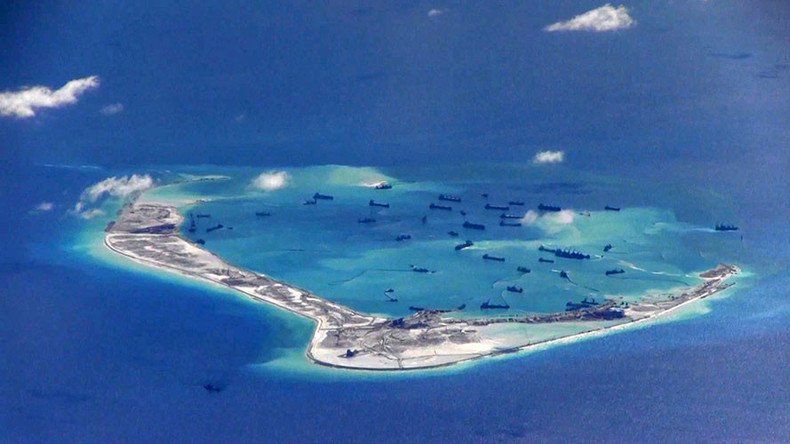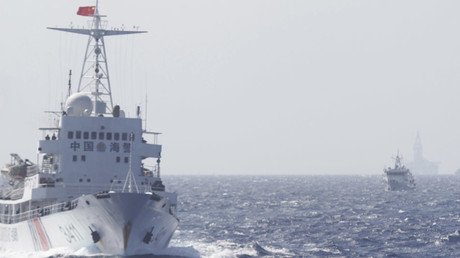South China Sea row: Hague Tribunal rules in favor of Philippines, China to ignore decision

China has caused irreparable harm to the ecosystem of the Spratly Islands and breached the Philippines' sovereign rights, the Hague Tribunal has ruled.
Beijing has ignored the ruling, saying its islands come with exclusive economic zones, where Chinese people have had activities for 2,000 years.
The court said in the 497-page ruling that “There was no legal basis for China to claim historic rights to resources within the sea areas falling within the ‘nine-dash line',” referring to a demarcation line on a map of the sea from 1947.
China has repeatedly warned that it would not recognize any adverse ruling from The Hague’s arbitration court, which was widely expected. Beijing boycotted the hearings at the Permanent Court of Arbitration, saying that it does not have jurisdiction to decide the dispute.
Advocacy groups celebrate an anticipated favorable ruling for Manila in the South China Sea dispute. #WestPHSeahttps://t.co/uPTom0SCbA
— Rappler (@rapplerdotcom) July 12, 2016
According to the Tribunal, Beijing's exclusive economic zone violates sovereignty by “interfering with Philippine fishing and petroleum exploration; constructing artificial islands and failing to prevent Chinese fishermen from fishing in the zone,” among other things.
The Tribunal further held that Chinese law-enforcement vessels had unlawfully created a serious risk of collision when they physically obstructed Philippine vessels, according to the press release.
Defense Ministry on #SouthChinaSea: Chinese troops to unswervingly safeguard state sovereignty, security, maritime rights & interests
— CCTVNEWS (@cctvnews) July 12, 2016
The foreign minister of the Philippines has already commented on the ruling, cautioning that those concerned must exercise sobriety and restraint, Reuters reported.
"Our experts are studying this award with the care and thoroughness that this significant arbitration outcome deserves," Foreign Affairs Secretary Perfecto Yasay told a news conference.
"We call on all those concerned to exercise restraint and sobriety. The Philippines strongly affirms its respect for this milestone decision."
Tokyo has urged all the parties to the case to comply with the ruling, with Foreign Minister Fumio Kishida noting in a statement that Japan has always highlighted the importance of the rule of law and the use of peaceful means in resolving maritime disputes, Reuters reported.
Road to the Philippines Embassy in Beijing blocked. Lots of police/plainclothes around. #SouthChinaSea = pic.twitter.com/czKs6kvbRZ
— Xinyan (@xinyanyu) July 12, 2016
China “solemnly declares that the award is null and void and has no binding force. China neither accepts nor recognizes it,” its Foreign Ministry said.
“China's territorial sovereignty and maritime rights and interests in the South China Sea shall under no circumstances be affected by those awards. China opposes and will never accept any claim or action based on those awards," the statement said.
Beijing has issued a statement reaffirming its territorial sovereignty, maritime rights, and interests in the South China Sea, the state-run Xinhua news agency reported.
Taiwan has also stated that it does not accept the Tribunal's ruling, insisting on the ‘Republic of China's’ sovereignty over South China Sea islands, Reuters reported.
Beijing has rejected the ruling, arguing that its islands come with exclusive economic zones. China’s Foreign Ministry said its position is consistent with international law and practices.
China has repeatedly claimed sovereignty over particular islands and reefs and their adjacent waters in the South China Sea and has taken steps to protect it. Beijing has always said that it was open to resolving the disputes through direct negotiations, but without outside influence and interference.
The dispute over the South China Sea involves the Spratly and the Paracel Islands. Beijing’s territorial claims to the islands partly overlap those of the Philippines, Vietnam and Taiwan, while Beijing also has ongoing territorial disputes in the area with Malaysia and Brunei.
Beijing has called Washington’s involvement in the dispute the “greatest” threat to the region, accusing the US of putting on a show of force by increasing its military strength and that of its allies in the region. To bolster its claims over the disputed territory, Beijing has been busy setting up defense installations in the area.
The US Navy is fiercely opposed to this Chinese initiative and has deployed additional warships in the disputed zone, conducted maneuvers near China’s artificial islands, and flown over them, while claiming it was all in the interest of “freedom of navigation.”













